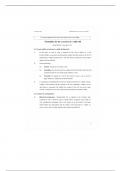Class notes
Pvl 2602 - Formalities for the Execution of a Will
- Course
- Law of Succession
- Institution
- University Of South Africa
This is a comprehensive and detailed note on Formalities for the Execution of a Will for Pvl 2602. Quality stuff!!
[Show more]



